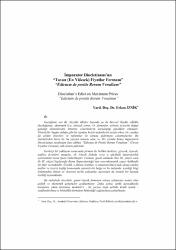| dc.contributor.author | İznik, Erkan | |
| dc.date.accessioned | 2019-10-19T16:03:37Z | |
| dc.date.available | 2019-10-19T16:03:37Z | |
| dc.date.issued | 2011 | |
| dc.identifier.issn | 1015-1826 | |
| dc.identifier.uri | http://www.trdizin.gov.tr/publication/paper/detail/TVRRd01EQXlNZz09 | |
| dc.identifier.uri | https://hdl.handle.net/11421/14190 | |
| dc.description.abstract | Geçtiğimiz son iki yüzyılda ülkeler bazında ya da küresel ölçekte sıklıkla duyduğumuz; ekonomik kriz, iktisadi sorun, vb. durumlar, aslında ticaretin doğup geliştiği dönemlerden itibaren, yönetimlerin karşılaştığı güçlükler olmuştur. Yöneticiler bugün olduğu gibi bir yandan krizin nedenlerini araştırırken, bir yandan da çözüm önerileri ve reformlar ile sorunu gidermeye çalışmışlardır. Bu önlemlerden birisi de, bu yazının konusu olan, ve 301 yılında Roma imparatoru Diocletianus tarafından ilan edilmiş “Edictum de Pretiis Rerum Venalium” (Tavan Fiyatlar Fermanı) adlı önlem paketidir. Devletçi bir yaklaşım sonucunda ferman ile birlikte herkese; giyecek, yiyecek, nakliye ücretleri, maaşlar, vb. birçok ürünün veya iş gücünün imparatorluk içerisindeki tavan fiyatı bildirilmiştir. Ferman, genel anlamda bize III. yüzyıl sonu ile IV. yüzyıl başlarında Roma İmparatorluğu’nun sosyoekonomik yapısı hakkında bir fikir vermektedir. Üstelik, o dönem üretilen ve imparatorluk içinde alınıp satılan mallar ve ticaret trafiği konusunda ayrıntılı bir belge ve bu anlamda, içerdiği bilgi bakımından iktisat ve ekonomi tarihi çalışanlar açısından da önemli bir kaynak özelliği taşımaktadır. Bu makalede öncelikle, genel olarak fermanın ortaya çıkmasına neden olan politik ve ekonomik gelişmeler açıklanmıştır. Daha sonra, farklı kaynaklarda karşımıza çıkan fermanın maddeleri - bu yazıya özgü şekilde kendi içinde - sınıflandırılmış ve böylelikle fermanın bütünlüğü sağlanmaya çalışılmıştır. | en_US |
| dc.description.abstract | Some statements like economical problems or financial troubles” that we have frequently heard in global meaning, do not belong to the last two centuries; but actually they are the unfavourable situations which the governments have faced throughout the history since the trade has appeared in large scales. Rulers tried to find the reasons of the crisis and also brought some remedies and made reforms in order to remove these unfavourable situations. Subject of this paper is one of these reforms, made by Diocletianus, Roman emperor in the year of 301, called as Edict on Maximum Prices (Edictum de pretiis Rerum Venalium). Edict declares the maximum prices of the some subjects like clothing, food, transportation, salaries, etc. in the Roman Empire. Actually it is an important historical source, because it reflects the social and economical structure of the Roman Empire at the end of IIIth. Century and at the beginning of the IVth. century. In additon to, it is a document which gives information in detail about the trade traffic and goods produced and sold in the empire. Therefore, it is a valuable source also for the historians dealing with the economy and finance. In this paper, it is firsly explained the political and economical developments resulting with the appearance of the edict. And then, paper tries to bring and to classify the the articles of the edict that we have found from the different sources. | en_US |
| dc.language.iso | tur | en_US |
| dc.rights | info:eu-repo/semantics/openAccess | en_US |
| dc.subject | Tarih | en_US |
| dc.title | İmparator diocletianus’un “tavan (en yüksek) fiyatlar fermanı” “edictum de pretiis rerum venalium” | en_US |
| dc.title.alternative | Diocletian’s edict on maximum prices “edictum de pretiis rerum venalium” | en_US |
| dc.type | article | en_US |
| dc.relation.journal | Tarih Araştırmaları Dergisi | en_US |
| dc.contributor.department | Anadolu Üniversitesi, Edebiyat Fakültesi, Tarih Bölümü | en_US |
| dc.identifier.volume | 30 | en_US |
| dc.identifier.issue | 49 | en_US |
| dc.identifier.startpage | 97 | en_US |
| dc.identifier.endpage | 130 | en_US |
| dc.relation.publicationcategory | Makale - Ulusal Hakemli Dergi - Kurum Öğretim Elemanı | en_US] |


















